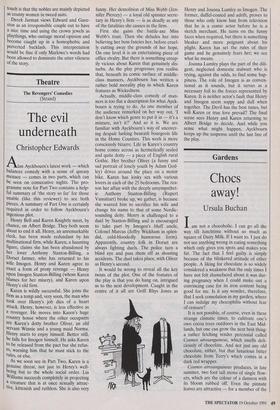Theatre
The Revengers' Comedies (Strand)
The evil underneath
Christopher Edwards
an Ayckbourn's latest work — which balances comedy with a sense of queasy menace — comes in two parts, which can be seen on consecutive nights. The pro- gramme note for Part Two contains a help- ful summary of 'the story so far' for those unable (like this reviewer) to see both Pieces. A summary of Part One is certainly required in order to follow Ayckbourn's Ingenious plot.
Henry Bell and Karen Knightly meet, by chance, on Albert Bridge. They both seem about to end it all. Henry, an unremarkable Clerk, has been made redundant by his multinational firm, while Karen, a haunting figure, claims she has been abandoned by her lover Anthony Staxton-Billing, a Dorset farmer, who has returned to his Wife Imogen. Henry and Karen agree to exact a form of proxy revenge — Henry Upon Imogen Staxton-Billing (whom Karen blames for her misery), and Karen upon Henry's old firm.
. Karen is wildly successful. She joins the firm as a temp and, very soon, the man who took over Henry's job dies of a heart attack, Henry, however, is less effective as a revenger. He moves into Karen's huge Country house where the other occupants are Karen's dotty brother Oliver, an old servant Winnie and a young maid Norma. Henry starts to enjoy himself. Better still, he falls for Imogen himself. He asks Karen to be released from the pact but she refus- es, warning him that he must stick to the rules, or else.
As we soon see in Part Two, Karen is a genuine threat, not just to Henry's well- being but to the whole social order. Lia Williams succeeds completely in projecting a creature that is at once sexually attrac- tive, kittenish and ruthless. She is also very funny. Her demolition of Miss Webb (Jen- nifer Piercey) — a loyal old spinster secre- tary in Henry's firm — is as deadly as any of the fatalities she causes in the firm.
First she gains the battle-axe Miss Webb's trust. Then she deludes her into believing her boss fancies her, before cruel- ly cutting away the grounds of her hope. On one level it is an entertaining piece of office rivalry. But there is something creep- ily vicious about Karen that genuinely dis- turbs. As the play progresses you realise that, beneath its comic surface of middle- class manners, Ayckbourn has written a rather bold morality play in which Karen features as Wickedness.
Actually, middle-class comedy of man- ners is too flat a description for what Ayck- bourn is trying to do. As one member of the audience remarked on her way out, 'I don't know which genre to put it in — it's a mixture, isn't it?' And so it is. We are familiar with Ayckbourn's way of uncover- ing despair lurking beneath bourgeois life in the Home Counties. This work is more consciously bizarre. Life in Karen's country home comes across as hermetically sealed and quite dotty — a piece of English rural Gothic. Her brother Oliver (a funny and sad portrait of lonely youth by Adam God- ley) drives around the place on a motor bike. Karen has kinky sex with various lovers in each of the 25 bedrooms. The rea- son her affair with the deeply unsympathet- ic Anthony Staxton-Billing (Rupert Vansittart) broke up, we gather, is because she wanted him to sacrifice his wife and change his name to that of some Nordic- sounding deity, Henry is challenged to a duel by Staxton-Billing and is encouraged to take part by Imogen's bluff uncle, Colonel Marcus (Jeffry Wickham in splen- did, cold-bloodedly humorous form). Apparently, country folk in Dorset are always fighting duels. The police turn a blind eye and pass them off as shooting accidents. The duel takes place, with Oliver as Henry's second.
It would be wrong to reveal all the key twists of the plot. One of the features of the play is that you do hang on, intrigued as to the next development. Caught in the centre of it all are Griff Rhys Jones as Henry and Joanna Lumley as Imogen. The former, duffel-coated and adrift, proves to those who only know him from television that he is a comic actor before he is a sketch merchant. He turns on the funny faces when required, but there is something bleaker and more poignant about his plight. Karen has set the rules of their game and he genuinely fears her; we see what he means.
Joanna Lumley plays the part of the dili- gent, neglected domestic stalwart who is trying, against the odds, to find some hap- piness. The role of Imogen is as conven- tional as it sounds, but it serves as a necessary foil to the forces represented by Karen. It is neither actor's fault that Henry and Imogen seem soppy and dull when together. The Devil has the best tunes, but will Karen or true love prevail? The final scene sees Henry and Karen returning to Albert Bridge to decide. And while you sense what might happen, Ayckbourn keeps up the suspense until the last line of the play.


























































 Previous page
Previous page